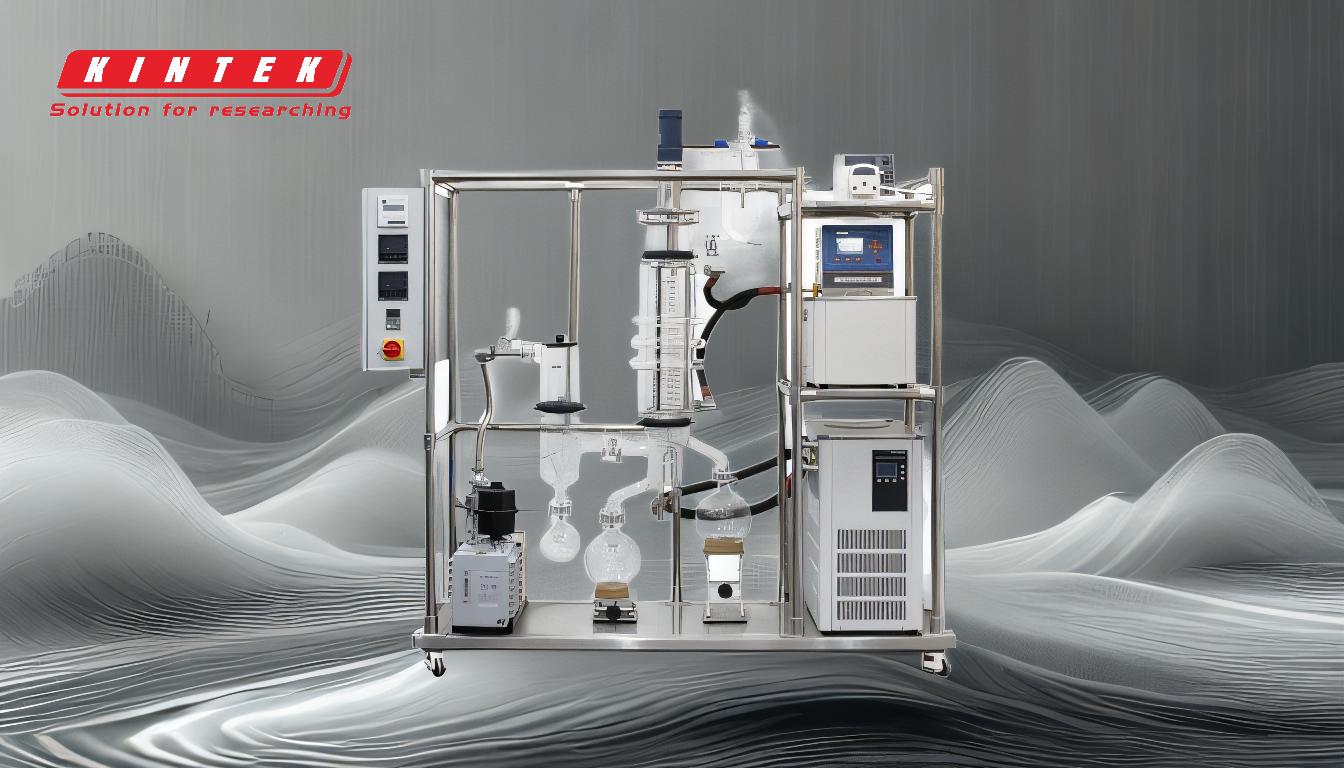Vacuum distillation is a specialized separation technique used to purify or isolate compounds with high boiling points or those that are thermally sensitive. By reducing the pressure in the distillation system, the boiling points of the compounds are lowered, allowing them to vaporize at temperatures where they would otherwise decompose or remain stable. This method is particularly useful for separating complex mixtures, such as aromatic compounds, and for applications like desalination, where it efficiently removes salt from seawater. Vacuum distillation minimizes thermal degradation, reduces energy consumption, and enables the separation of compounds that are otherwise difficult to isolate under standard conditions.
Key Points Explained:

-
Lowering Boiling Points Under Reduced Pressure:
- Vacuum distillation operates by reducing the pressure in the system, which lowers the boiling points of the compounds being distilled. This is based on the principle that boiling occurs when the vapor pressure of a liquid equals the surrounding pressure. By reducing the pressure, compounds can vaporize at much lower temperatures, preventing decomposition or degradation that would occur at their normal boiling points.
-
Separation of Thermally Sensitive Compounds:
- Many compounds, especially organic molecules like aromatic compounds, have high boiling points and are prone to decomposition when heated to their normal boiling temperatures. Vacuum distillation allows these compounds to be separated without exposing them to excessive heat, preserving their integrity and ensuring high-purity distillates.
-
Energy Efficiency:
- Since vacuum distillation requires lower temperatures to achieve boiling, it consumes less energy compared to traditional distillation methods. This makes it a cost-effective and environmentally friendly option for industrial-scale processes.
-
Combination with Other Distillation Techniques:
- Vacuum distillation is often combined with steam or fractional distillation to enhance separation efficiency. For example, in the separation of complex mixtures like essential oils or petroleum fractions, vacuum distillation can be used to isolate specific components that would otherwise be difficult to separate.
-
Applications in Desalination:
- One of the most significant industrial applications of vacuum distillation is in desalination, where it is used to remove salt from seawater to produce fresh water. The reduced pressure allows water to evaporate at lower temperatures, making the process more energy-efficient and scalable for large plants.
-
High-Purity Sample Preparation:
- Vacuum distillation is widely used in laboratories and industries to obtain high-purity samples of compounds. By avoiding high temperatures, it prevents the formation of impurities or by-products, ensuring the distillate is of the highest quality.
-
Versatility in Industrial and Laboratory Settings:
- This technique is versatile and can be applied to a wide range of materials, from organic chemicals to inorganic salts. It is particularly valuable in industries like pharmaceuticals, petrochemicals, and food processing, where the purity and stability of compounds are critical.
-
Reduction of Thermal Degradation:
- By operating at lower temperatures, vacuum distillation minimizes the risk of thermal degradation, which is crucial for preserving the chemical structure and properties of sensitive compounds. This is especially important in the production of fine chemicals and active pharmaceutical ingredients (APIs).
In summary, vacuum distillation is a powerful and efficient technique for separating and purifying compounds that are otherwise challenging to isolate under standard conditions. Its ability to operate at lower temperatures, reduce energy consumption, and prevent thermal degradation makes it indispensable in both industrial and laboratory settings.
Summary Table:
| Key Benefits | Applications |
|---|---|
| Lowers boiling points under vacuum | Separation of aromatic compounds |
| Preserves thermally sensitive compounds | Desalination and water purification |
| Energy-efficient process | High-purity sample preparation |
| Reduces thermal degradation | Pharmaceuticals and petrochemicals |
| Combines with other distillation techniques | Food processing and essential oils |
Learn how vacuum distillation can optimize your processes—contact our experts today!
















